|
“I am so thankful because the program gave me the chance to understand that WDP is so much more than a special day of prayer. I will be able to explain to other women all that I have learned, discovered and received. And I will do it using what we learned through the Transformational Leadership training program.” 45 women came from all over Ghana to Accra for a 2-day workshop about women and Transformational Leadership and to deepen their knowledge about World Day of Prayer from the global to local level. Representatives came from the Presbyterian, Methodist, Baptist, Lutheran, African Methodist Episcopal, Anglican, Catholic and Greek Orthodox Churches. The workshop was held on October 21st and 22nd at Saint Barnabas Anglican Church, Osu. The first day focused on leadership, the WDP organization, history and Guiding Principles, and the Thursdays in Black Campaign. On the second day, we took time to answer questions and deepen the conversation. Then we held one more session on Women and Transformational Leadership. We closed the workshop with the 2020 WDP worship service prepared by WDP Zimbabwe and studied the Gospel of John 5:2-9. With songs, dances and prayers we shared a great fellowship. We felt blessed during these two days together! - Joyce Larko Steiner, WDPIC African Regional Rep & Laurence Gangloff, WDPIC Chairperson
13 Comments
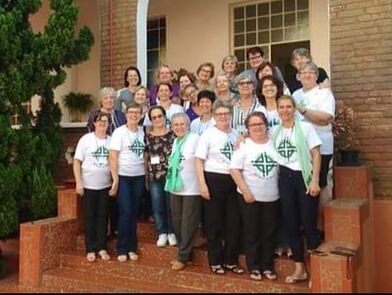 WDP Brazil WDP Brazil The theme for the 2020 WDP Zimbabwe program speaks directly to the heart and mind of women in Latin America, who still suffer under a ‘machista’ culture. As part of the Brazilian committee, we studied the theme at our Assembly and we felt inspired by the words of Jesus: “Rise! Take Your Mat and Walk!” In the Bible text, John 5:2-9a, we read that Jesus changed the life of a man who was ‘stuck’ and didn’t have much hope in changing his situation. He couldn’t think about the future. He was just surviving day by day, but then Jesus changed the life of this man. Jesus asked him an important question – Do you want to be healed; do you want to change your life? It seems obvious that someone would say yes but sometimes the answer is not so clear to us. Many women in South America cannot even think about the possibility of having a different life. It seems impossible for them. They feel that, just like the man in the story, they have nobody to help them so they wait and hope for their circumstances to change. The bible story shows us that for Jesus nothing is impossible. Sometimes women feel paralyzed like the man in the bible story, just seeing obstacles. With faith and Jesus’ guidance we can change negative situations in our life that do not seem to have a solution at first glance. Jesus encourages women to rise, to take our mat, which symbolizes our excuses, and leave it behind and walk. Jesus empowers us to believe that a different life is possible. Change is possible for those who believe in Jesus and in his words. Jesus enables us to move forward. On behalf of the WDP of Brazil, Grytsje Couperus participated in a retreat in Caacupe, Paraguay to prepare for the WDP of 2020. Women from the hosting country, including the indigenous Paraguayan, and women from Brazil and Argentina were present. At this annual gathering women study together and prepare for the worship service on the first Friday of March. One of the participants shared a story about her life. How she had suffered for 20 years married to a drunken womanizer. She felt ashamed for not being able to keep her marriage and guilt for the divorce until she understood Jesus’ liberating words. Jesus’ words “Rise, take your mat and walk,” made her cry and freed her from sadness and frustration. She took her mat, and believed that she was allowed to be happy and to have a different life. Her old life was over, Jesus told her to rise and to move on. May Jesus’ words continue to liberate women who still suffer in a culture that does not value them. - Susana Renner, WDPIC Regional Rep. of Latin America
 Al final de Julio, estuvimos reunidas como el comité ejecutivo del Comité Internacional de Día Mundial de Oración, en NY. Dedicamos nuestros devocionales a reflexionar desde el tema y pasaje que nos propone Zimbabue “Levántate, toma tu camilla y anda”. Cada palabra trajo motivación y retos a nuestra vida. Regresé a casa pensando en el pasaje que tiene aún mucho que decirnos personalmente y a nuestro movimiento del DMO, y aun nos anima desde nuestro lema a “Informarse para orar y orar para actuar.” El título del pasaje y el desarrollo de la historia en el evangelio de Juan 5:2-9 hacen referencia a un lugar, Betesda, que significa, “Casa de Misericordia”. Sin embargo, parecía que no había mucha compasión en ese lugar, hasta que llega Jesús. Son siempre los encuentros con los demás los que mueven a Jesús a misericordia. Este hombre sin nombre, conocido como el paralitico de Betesda, tiene una historia que mueve a Jesús. Su historia puede ser la de muchas mujeres y personas en el mundo hoy. Una historia que no había sido contada, o que fue ignorada, por una sociedad indiferente a las necesidades de los demás. Una sociedad que margina y aglomera en determinados espacios y lugares a aquellos que se salen de la norma, a los diferentes, los enfermos y despreciables según sus criterios. El pasaje nos habla de un cuerpo afectado. Él se ve imposibilitado para moverse, lo que significa que depende de otros, y aun pasa por mucho dolor. Pero aquí, no se nos menciona el dolor o sufrimiento físico, como en otros personajes de la biblia que recibieron milagros. Había otra historia que debía ser contada. Claro que debió haber dolor en su cuerpo, por eso estaba ahí, pero es seguro que el dolor mayor era otro. El dolor de la indiferencia de quienes podrían ayudarle pero estaban pensando en ellos mismos y de los que ni siquiera llegaban ahí. Treinta ocho años es toda una vida siendo testigo en ese estanque del egoísmo y la discriminación, ese es el mayor dolor experimentado por cualquier ser humano que sufre en soledad. Este espacio compartido huele tristeza e impotencia. Ese es otro tipo de parálisis social al que hoy hay que decir con autoridad -- ¡Levántate, muévete de tu conformismo, camina, sal de la indiferencia y haz algo por tu prójimo! Pero el pasaje nos narra un aspecto para mi sumamente importante, pues a pesar del dolor físico y moral que podría vivirse en estas condiciones este hombre tiene 38 años abrigando la esperanza de ser sano, de estar bien, de que su realidad cambie, de lograr tener una vida digna. ¡La esperanza es lo último que se pierde! decimos en Costa Rica. Ahí está él, fiel, esperando que las aguas sean agitadas para poder sumergirse en ellas y ser sano. Le valió la fe, le valió la espera, porque Jesús el agua viva vendría a visitarlo para que dé su interior corriera el coraje de levantarse, tomar su pasado y caminar hacia su futuro. Necesitamos llegar al lugar donde están las personas con múltiples necesidades y hacer lo que hizo Jesús. Jesús le prestó atención --miro su posición y supo que llevaba mucho tiempo así (v. 6). Mirar a los otros y conocer sus historias, nos mueve a compasión. Jesús le preguntó: ¿Quieres ser sano? Obvio que quiere ser sano, diríamos. Pero la pregunta abre el dialogo, permite la interacción y muestra el interés real por los demás. Es como darle voz al que no ha sido escuchado. Es disponerse a escuchar sus historias, dejar que salga su dolor, es darles la palabra. Notamos que cuando habló, no se quejó de cuanto le dolían sus piernas o su cuerpo, sino del dolor mayor que ha experimentado por años que era no tener quien le ayudara, quien pensara en él y le apoyara de alguna manera. Él habló del dolor de no ser prioridad para alguien, y de ser siempre el último en la lista. ¿Queremos ver mujeres y personas levantarse, tomar su camilla y caminar? Entonces vallamos ahí donde están postradas de múltiples formas abrigando una pequeña esperanza. Mirémoslas, mostremos interés real por ellas, escuchemos sus historias. Presentémosles con nuestras acciones a Jesús, el agua Viva, y seguro que veremos milagros. Esa es nuestra Betesda, ese es el lugar para la misericordia. - Rebeca Cascante Gómez, Coordinadora Regional de Latinoamérica
While reflecting on the story of Jesus’ healing in John 5 in anticipation of the World Day of Prayer 2020 celebrations, I am reminded of the value of intention. When we read the story of the man by the well, Jesus’s command to action can be read as a directive to follow Jesus and listen to his instruction. What about the intention of the sick man at the well? For 38 years, this man had been unable to walk and was unable to move himself to the pool to be healed. He had been waiting and hoping for years until Jesus found him. When Jesus told him to stand, he had faith and he stood up – healed! Can you imagine how strange this must have been for the sick man? For 38 years he was paralyzed, when suddenly a man arrived with the answer to his problems – just stand up! Can you imagine how ridiculous that would have sounded to the sick man? He easily could have brushed Jesus off and continued to wait for someone to help him into the pool. Instead, the man chose to rise, pick up his mat, and walk away from his place by the pool. This story of healing reminds me of the World Day of Prayer movement. In the past, I have attended meetings locally, nationally, and internationally. One of the biggest topics of conversation is “how can we keep the movement growing?” While many ideas are shared, we often remain comfortable in our traditional, and oftentimes shrinking, first Friday in March service and do not seek to go beyond the confines of the calendar and the walls of our churches. We host our service, enjoy the celebrations, then sit by the well and wait for someone else to come up with a new idea. World Day of Prayer is about turning informed prayer into prayerful action, a practice that goes beyond a single day of service. Why not host a WDP community breakfast or dinner, turn the service into a local play, or even organize a sports day? One creative WDP group in Bolsover, Ontario, Canada organized a paint night inspired by the WDP Slovenia program! Participants gathered and followed an artist’s instructions to paint a honeybee hovering over a pincushion flower to celebrate World Bee Day, which was sponsored by the Slovenian government to the UN in 2017. There are many creative ways that we can spread the message, love, and prayers to new folk and to strengthen lasting WDP relationships. Take a look at your WDP team - are you laying by the well waiting for someone to change things for you? Or are you willing to take ownership and rise, take your mat and walk! - Lauren Wilks, WDPIC Regional Rep. of Caribbean and North America
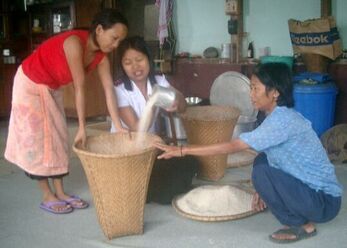 Rice is the staple food in India, and women are the carriers of this cultural practice. About 70% of rural women, especially indigenous women, are farmers - though their labor is not always recognized. Traditionally rural and indigenous women, who are the custodians of native seeds, tend the paddy, harvest the crop that sustain the family and small-scale farming economy of the country. In the North Eastern region of India, surrounded by lush green mountains, there are indigenous Christian women who also found in that labor a way to contribute to the communities through their participation in the church ministry. Since the missionary movement in the early 1910, when people in the North Eastern part of India did not know much about the Gospel, Mizo women in Mizoram state and Kashi tribe women in Meghalaya, were very aware of how they could participate in God’s mission. They placed a pot near the fireplace where they cook and labeled it ‘God’s Pot’. No matter how little they have for themselves, they set aside one handful of rice from every meal they prepared. After a month, they would sell the collected rice and use the money to support missionaries and their outreach mission activities to take care of orphans, the destitute and those in need in their own communities. The participation of women during the missionary years is the same mission context that originated World Day of Prayer in North America. When women are aware of the needs of their communities, they want to do something. In the giving of their labor, women in the North Eastern part of India reflected their prayer and faith. Within the Presbyterian Church of India, this practice is known as ‘Handful of Rice’. In the World Day of Prayer, we call it “informed prayer and prayerful action”. Both perspectives meet during the common day of prayer on the first Friday of March. The rice put aside is a gesture of prayer for the church – who still does not ordain women in India, for the home – where domestic violence is high, and for the country – where rural and indigenous communities’ struggle not only with poverty but with various forms of gender based violence. On this past celebration, motivated by the program written by WDP Slovenia, women from India came together in prayer and were thankful for God’s call – Come – everything is ready! - Rev. Moumita Biswas, WDPIC Asia Regionl Representative
Par la guérison du paralytique (Jean 5:2-9a), Jésus révèle le don du Père. Le paralytique dans son état d’isolation a besoin d’une présence pour le jeter dans l’eau au moment de l’agitation afin qu’il recouvre la santé. Mais le Seigneur se présente à lui dans ses moments de découragement et d’angoisse, non pas pour le jeter à l’eau, mais pour lui dire une parole forte et d’engagement : « veux-tu être guéri ? » La réponse du malade montre sa volonté et la reconnaissance de la puissance de Jésus, qui lui dit : « lève-toi, prends ton grabat et marche.» Trois expressions d’action : se lever, prendre son lit et marcher. La foi du paralytique lui permet non plus de se faire jeter dans l’eau, mais de guérir par la parole prononcée par Jésus. Passer de l’ignorance à l’écoute de la parole, de la séparation à la communion, de l’isolement à la rencontre, de l’incrédulité à la foi sont les transformations du paralytique qui vient d’accueillir le Seigneur avec foi accédant ainsi à une nouvelle vie. Le monde traverse aujourd’hui des crises de tout genre, les sinistres causés par les inondations, les incendies, les guerres etc… Le thème « Lève-toi, prends ton grabat et marche » est un thème d’encouragement qui nous fait comprendre que tout n’est pas fini, et qu’il y a encore de l’espoir car le Dieu d’amour et de miséricorde est présent pour nous sortir de nos prisons de résignation. A travers le thème du Zimbabwe, les femmes de la JMP en particulier et les femmes du monde au lieu de sombrer dans les maux qui minent les pays, doivent se lever pour dénoncer toutes les formes de violences qui au lieu de promouvoir l’être humain l’anéanti plutôt. Nos voix doivent s’entendre à travers nos prières, et nos actions en faveur des nécessiteux. Accueillons la parole du Seigneur qui nous donne la force et le courage de nous lever et de promouvoir le mouvement de la Journée mondiale de prière dans nos communautés et dans le monde entier! - Henriette Mbatchou, WDPIC Regional Rep. Africa
Dear friends of World Day of Prayer, With our sisters from Slovenia, we sang joyfully "Come along, the feast is ready". The song introduced us to the theme based on the Gospel of Luke, chapter 14 - "Come - Everything is ready". The celebration was great. The first feedback about the program I heard was about it being positive and heart-warming. All participants are grateful. But after the feast, we return to the liturgical time of Lent. In France, the churches invite believers to refocus their lives on God, to become aware of God's place in their lives, family, society, and in the world. There are a lot of conferences and concerts. All of them urge us to move towards the Holy Week - the passing from pain of death to the joy of Resurrection. Suffering is present in all its forms in our world. Violence is omnipresent. But our conviction as Christians today is to strongly affirm that death, violence and suffering will not have the last word. We proclaim it every time we prayerfully repeat the Confession of our faith that “Jesus died, went down into hell and rose again on the third day”. We firmly know that death will never have the last word again. That is why we can tirelessly say NO to violence and NO to rape. The Thursdays in Black campaign spearheaded by the World Council of Churches and supported by World Day of Prayer may be a sign of our hope. Sisters and brothers, I sincerely encourage you to join the movement of spreading hope and say NO to all forms of violence. Together we can bring the changes that our world so desperately needs. On Easter morning, I wish your heart to be filled with joy as the tomb is found empty in Jerusalem: "Jesus the crucified, is risen, He is risen indeed". Receive the peace that only God gives! - Laurence Gangloff, WDPIC Chairperson
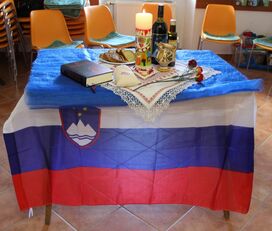 The WDP women of Slovenia invite us to pray with them. Many communities got together to learn and listen with women from Slovenia. Now, the table is set and the invitations were sent. Who would come? We pray that we will have the wisdom to live in the moment of the feast and rejoice in it. We pray that our hearts will be ready to receive the invitation of Jesus, an invitation to love each other, and to be welcoming. Here is the challenge that Jesus presents us this year: open the heart to those whom you know nothing about. Will we dare to open the door and welcome whoever in our context is like "the lame, the blind, the crippled and the poor"? (Luke 14:15-24) The WDP Slovenia committee has been engaged in preparations for the celebration since April 2016. Members of the committee, including current president Tanja Povšnar Vrečar, share with us in excitement: “We want to show Slovenia in all its beauty and needs. We will be present around the world in the prayers, minds and hearts of so many. United in the same prayer, though different languages, we will worship the same God and build this international sisterhood. What a joy to do this all together! Slovenia is a small country in Europe with a relatively well established economy, with unemployment rates down since the beginning of our WDP worship service material preparation. We have access to education and health services. But still in need to be with God, with our families and with ourselves. We get busy with our lives, forgetting to accept Jesus’ invitation to the feast. Thank you for the reminders. Please, keep us on your list of invitees and let us be the hosts for those who are vulnerable. We wish you a great celebration on the 1st of March!” Jesus’s message of love is radical and it is expected that we – Jesus’ disciples - will put the teaching into practice. We join you in prayers that the Holy Spirit will be at work at the heart of our services and that we will be able to leave our places of celebration feeling blessed for having taken up such a challenge! We wish you a blessed and happy feast! - Laurence Gangloff (Chairperson) & Rosângela Oliveira (Executive Director)
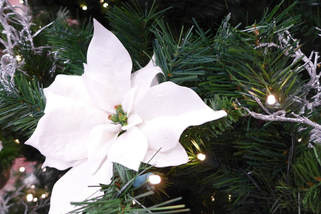 Does Christmas have a special color in your country? In the region where I live, the colors used are mostly red and green, while elsewhere I have seen white or purple. What memories do they bring to you? We reach the end of the year making plans for the celebration on March 1st 2019 written by women of Slovenia. We set the table, and go out to the streets to invite “Come, everything is ready.” Some will come with their hearts heavy of suffering, others, anxious for a break from their daily struggles. Together, we will realize that change begins with the recognition of God’s love. Christmas is the time in which we make room to welcome Jesus, Emmanuel, the Prince of Peace. As Jesus’ witnesses in this frightening world, I hope that we hold the Prince of Peace in our hearts a little longer than the Christmas celebration. I wish the Holy Spirit gives us courage to confess without fear the love of Jesus for all. Friends of the World Day of Prayer, thank you for your commitment, support and dedication to “Informed Prayer. Prayerful Action”. We had an enthusiastic response to this year’s theme, developed by women of Suriname, who left us, more than before, conscious of our responsibility as caretakers of God’s creation. "May the God of hope fill you with joy and peace in faith" (Romans 15:13) Merry Christmas and happy, blessed New Year! - Laurence Gangloff
WDPIC Chairperson 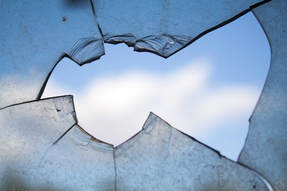 Today on the last day of the 16 Days of Activism we recognize Human Rights Day! This year marks the 70th anniversary of the day the United Nations adopted the Universal Declaration of Human Rights to ensure every human being - regardless of race, color, religion, or sex - is protected through inalienable rights. We celebrate the anniversary by highlighting a story shared by our Caribbean & North America regional representative, Ruth V. E. Phillips: “I am a 51 year old pastor who grew up in a Caribbean family which was punctuated with fights and beatings between my grandparents, my aunts and their husbands or boyfriends, my mother and my father, and my mother and my sister’s father. All on my mother’s side of the family. I made up my mind that that would not be me! "I worked my prayers, and my faith in believing that I must have a life different to the life my grandmother, mother and aunties had, have brought me to where I am today. Praise the Lord. No longer does the abuse happen in my family because I teach my son that love does not strike to cause pain. I teach him by example of the way I live about abuse. I talk it out. I pack the hurt with love. I forgive." Read the full story on the WCC Pilgrimage of Justice and Peace blog, click here. |
Archives
April 2025
Categories
All
|
||||||||||||||
|
Home Image: Yoruba dancers at the World Yoruba Carnival of Arts and Culture festival ©Creative Commons Attribution-Share Alike 4.0 International
|




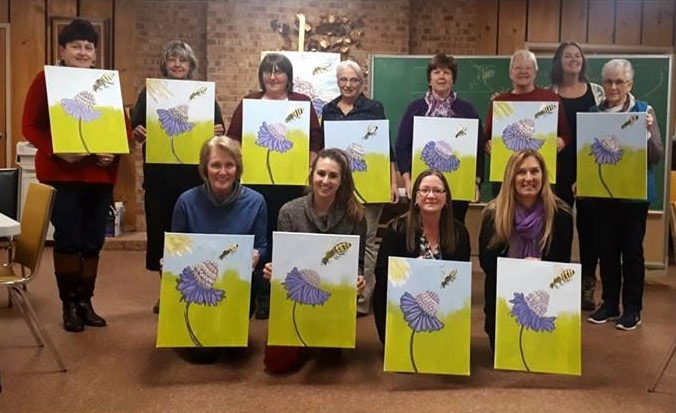



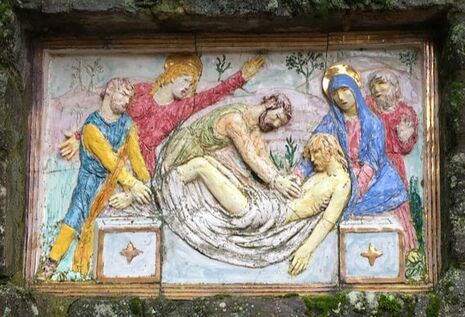
 RSS Feed
RSS Feed